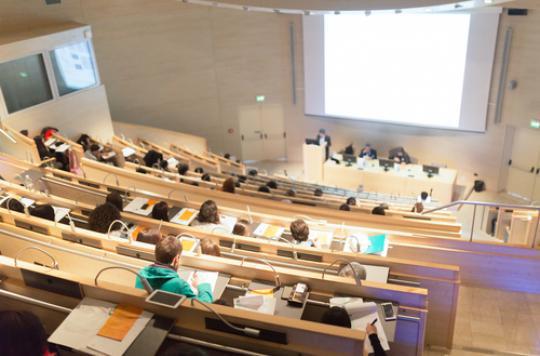The Order of Physicians proposes to create a regionalized numerus clausus, based on the training capacities of universities and the possibilities of organizing internships in the territories.

The Order of Physicians (CNOM) published on Tuesday its health reform project with a view to the 2017 presidential election. The ten measures to transform the system are organized around four main principles: “liberate by offering a framework that catalyzes the energies of individual actors, simplify, guarantee real access to care for all , but above all decentralize ”.
The CNOM indeed proposes to revolutionize the organization by relying on the territories. And this strong demand for dust removal also affects medical studies which should be fundamentally transformed.
The institution wants first of all to tackle the numerus clausus (number of students admitted in the second year). According to Dr Patrick Bouet, president of the CNOM, it has proved its ineffectiveness. “It does not regulate medical demography, it is bypassed (European or extra-European doctors as well as French students trained abroad currently represent a growing proportion of new doctors), it is unsuited to needs,” he believes. -he.
A regionalized numerus clausus
The latter therefore recommends grooming even though the Minister of Health recently announced a 6% increase in the number of candidates admitted to the entrance examination for the second year of medicine (+478 places in 2017).
The CNOM, for its part, wants to create a regionalized numerus clausus, “based on the training capacities of university establishments and the possibilities of organizing internships during schooling in the territories”. At the same time, the Order recommends considering a pre-selection system before the first common year of health studies (PACES), which has been extended in order to limit failure rates.
Regarding the continuation of medical studies, the CNOM does not mince words either. With a severe diagnosis: “The second cycle of medical studies suffers from a lack of professionalization outside the hospital. Theoretical education takes an increasingly important part in the timetables ”.
More chances of success in ECNs
The Order therefore suggests strengthening the professionalization of the second cycle up to the boarding school. As always, this philosophy is accompanied by a desire for regionalization now claimed by the CNOM. As such, it wishes to transform the ECN (National Classifying Examinations giving access to the 3rd cycle of medical studies) into Interregional Classifying Examinations (ECIR) in 5 major inter-regions.
The places available would be defined here for each major inter-region and for each specialty, according to regional demographic needs, as reported by the Bassins de Proximité Santé (BPS).
These new tests would also be an advantageous system for young interns who, instead of playing their future assignment on a single examination organized over 3.5 days, will now have 6 chances of success. It will indeed be possible to compete in several inter-regions (with a maximum of 3 competitions per year) over two years. A eliminatory score will still be established, but with the possibility of doubling.
Young doctors in medical deserts
Finally, the Order wants to encourage young graduates to take voluntary work in under-medicalized areas through the creation of a new “postDES for the area”. In return for a three-year exercise in a stressed area, these doctors would benefit from compensation: social or tax benefits, faster career progression, contractual benefits, etc.
.















